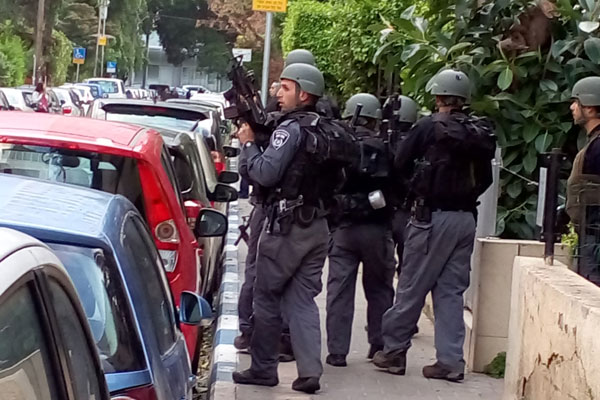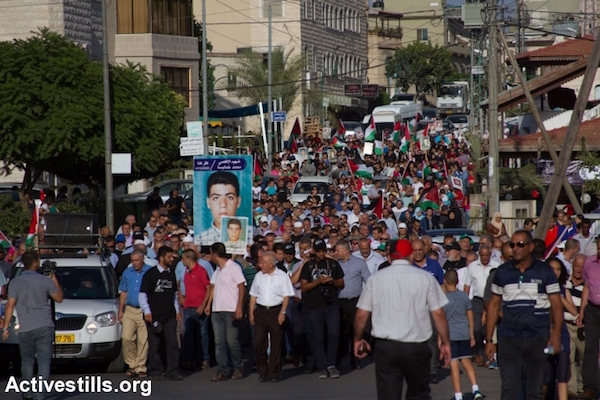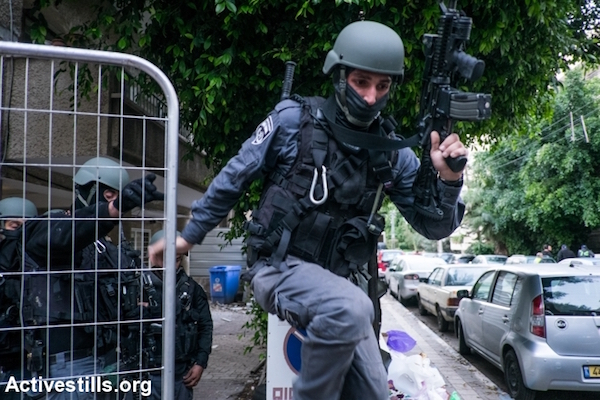For the past 15 years, the police have made efforts to work alongside Arab society. But as violence rises, they are once again being regarded as a quasi-military force more interested in state security than in reducing crime.
By Amnon Be’eri Sulitzeanu

During a weekly cabinet meeting in mid-January, Prime Minister Benjamin Netanyahu demanded that increased law enforcement in Arab towns be a prerequisite for the recently-passed economic development package aimed at the Arab sector. Two weeks later, the government announced the creation of a new special police unit responsible for law enforcement in Arab areas. It was reported that this unit will be tasked with establishing police stations in Arab towns, recruiting Arab policemen, and dealing with a variety of issues such as traffic accidents, unauthorized building, and possession of illegal weapons.
The creation of a separate police force for a specific sector of society is a clear threat to the basic ethos of “color blind” policing. Moreover, the formation of such a unit is far from a panacea to the challenge of providing equitable policing for Arab society while also addressing high crime rates. The real issues of policing and Arab society are not internal organizational issues —they are a conceptual failure which, until addressed, will keep the rift in police-Arab relations firmly in place.
The root of this failure is in the dual roles played by police toward the Arab community: there is an expectation to police for the sake of the community, while also being responsible for internal state security, according to which Arab citizens are perceived as a threat. This conceptual dissonance puts Israeli police in a situation of providing personal safety for a civilian population that is viewed with deep suspicion. Unsurprisingly, it doesn’t work.
The stark contradiction between providing “policing services” and “security enforcement” is even manifested visually. The classic look of local policemen in blue uniforms, carrying handguns, with recognizable faces with visible name tags can swiftly be replaced by a militarized unit — Border Police or special forces, armed from head to toe, wearing dark uniforms and face masks, who do not wear name tags.

This double role is the main obstacle preventing the police from viewing Arab citizens as legitimate beneficiaries of policing. For decades we have witnessed a jarring policing deficiency in Arab society, illustrated by an unconscionable disparity in resources between Arab and Jewish towns. Police presence is sparse at best in Arab towns, where crime and violence have reached epidemic proportions and few crimes are solved.
Arab citizens primarily view the police as a security force that has long neglected the community’s real needs, leading to a complete lack of trust. Healthy cooperation with communities is a key factor for successful policing, irrespective of locale. As long as the Israeli police continue to function as a security force, they have no chance of gaining the trust of Arab citizens and achieving their goals.
These core issues were covered in detail by the Orr Committee, which investigated the events of October 2000, when police shot and killed 13 Arab protestors. In the decade that has passed following the release of the Orr Commission report, the police have undertaken a series of measures aimed at improving services and earning Arab society’s trust. Training workshops addressing subjects such as fair policing in a divided society were integrated into courses for police at all levels. Furthermore, the police began building robust channels of communication with local Arab leaders. The police also appointed an Arab police spokeswoman, and police informational materials were translated into Arabic.

Several of these efforts were facilitated and shepherded by the Abraham Fund Initiatives, which in addition to working with the police, also worked extensively within Arab community and its leadership to encourage demand for equitable and effective policing, which is essential in creating personal security — a most basic civil right that is often lacking in Arab society.
Our activities in this field have been fruitful. The schism between community-based civil policing and strict security enforcement has been narrowed over the last decade as policing has become beneficial for the Arab community. These paradigmatic shifts took shape in open communication between police and Arab leaders, even during periods of increased tension. We began witnessing smarter and more effective police responses to demonstrations, resulting in a decrease in casualties and confrontations with police. These positive developments have been mirrored by an increased willingness amongst Arab citizens to work with the police and fight crime and violence in their communities.
The understanding that violence and crime cannot be addressed without the police has taken root in Arab society, and the phrase “we have no other police” has become widespread. A 2014 survey commissioned by the Abraham Fund found that 46 percent of Arab citizens polled said they would be ready to meet and consult with police on how to eradicate crime in their communities. And, 56.5 percent said that they are ready to organize or join community actions to combat crime. Only a small minority viewed engaging with the police as legitimate just five years prior.
While the overall trajectory of police-Arab relations has been positive, it is clear that the recent transitional process in the police has reversed the trend. As Chief Commissioner Yohanan Danino’s term neared its end, the police decided to discontinue trainings on equitable policing. This comes at a time of an intense wave of violence that has reframed the perception of the police, causing it to look more like a security force.

The use of police as a security force has altered how policemen think and behave, turning them from civil servants into combatants. Moreover, security and combat work carries a higher level of prestige among Israeli society; a policeman who stops an armed attacker is perceived as a hero, as opposed to the public image of a policeman who deals with traffic violations or domestic violence. It should be expected that as long as the current wave of violence continues, the self-perception of the police as a quasi-military force will only intensify, even after the police return to serving the community in their regular capacity.
The consolidation of the police’s role as a security force has been reinforced by recent appointments at the most senior level. Following a tradition of police chief commissioners who were raised on the idea that policing is a profession, Israel’s Minister of Public Security, Gilad Erdan, appointed a former deputy director of the Shin Bet as chief commissioner. His newly-appointed deputy commissioner also comes from a security background, having gained most of his experience as the commander of the Special Police Unit, which deals mainly with counter-terrorism. These appointments are a strong statement by the government regarding the future police’s role in Israeli society.
Recent police actions, including the search for and killing of homegrown terrorist, Nashat Melhem, and home demolitions in the Arab town of Taibeh, are increasingly resembling the actions of armed forces interacting with a population under military rule.
The creation of a new unit dealing specifically with the policing of Arab society is not an appropriate solution to the failings enumerated above. If anything it represents an entrenchment of divisive policing and inequitable provision of services. The police leadership must internalize that when it comes to the Arab society, its main task is to methodically implement practices of equal and fair policing through cooperation and dialogue. Above all, the duality of the police’s mandate must be understood as the central obstacle to cultivating police-Arab relations. This must be the police’s undertaking, at least until we reach that historic moment in which the police are no longer involved in security. This will free the police from the burden of being a player in the Palestinian-Israeli conflict, and enable the development of a normal police force.
Amnon Be’eri-Sulitzeanu is the global co-executive director of the Abraham Fund Initiative. This article was first published in Hebrew on Local Call. Read it here.

